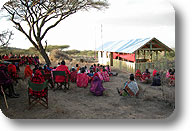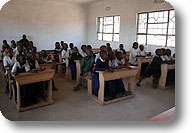What's New
At the Foot of Kilimanjaro

The Park decided to discover this reality and offered to the local community the experience of its own staff for three weeks. Despite the several bureaucratic papers, the difficulty to find some material, and the heat, the team from Cuneo has been able to build a camp to manage a safari activity by camel, radio and photovoltaic equipment, a photographic dossier and shoots to promote the safari activity in Italy. Moreover, the staff brought many objects useful to the local school and hints to enhance the work of the Masai women.
Istituto Oikos, a non-governmental organization from Milan, has provided the logistic support: this organization has been working for years in Tanzania in collaboration with Tanapa, the management body of the Tanzanian National Parks.
The Park vice-director, Giuseppe Canavese, says: “We arrived at night without realizing where we were. When we woke up, a wonderful sun welcomed us, illuminating on the one side the snow of Kilimanjaro and on the other side the green slopes of Mt. Meru. We were in the middle of a dry savannah full of trees and bushes, a tangled mass of thorns. We immediately went with the Masai to analyze the place where we would build the new camp. At the beginning, mistrust dominated: we exchanged our feelings mainly in dialect while working with axe, shovel, and wheelbarrow to prepare the soil and then throw the concrete on which we had to build two wooden structures; they looked at us and exchanged indecipherable comments in Masai language. However, the mistrust did not last long. One of the Masai, Lazàro, began to do the same things we were doing, and gradually we integrated.”
Day after day, we built together the two structures, one for the Masai and one for the tourists of the Camel Safari, four wooden sites for tents and two toilets. Short after our departure, the photovoltaic equipment and the radio station were ready: essential for the management of the tourist activities.
Canavese says: “We met the children in their school of Mkuru. One only teacher, sent by the Government, had begun to teach them Swahili, the official language in Tanzania, since they only speak Masai. A plastic bag, a crumpled notebook and a pencil are the things they bring along for kilometers, in their journey from the village to the school. We gave them notebooks, pencils, pencil sharpeners, rubbers, an abacus, and some colors. The children, in a desk where three of them were sitting - a much smaller desk than ours - welcomed us, smiled to us, happy, and sang songs that we would listen many times during our stay in Africa”.
The three weeks went by very fast and at the end, the Masai organized a party in costume, to which also the local authorities took part. During the party, the team of Alpi Marittime handed them out the camp where two flags, one of Parco Alpi Marittime and one of the Masai from Mkuru wave, with Kilimanjario and Mt. Meru in the background.
Canavese says again: “We will never forget the glances of the children from Mkuru, their caresses on the hands and faces, the rather clumsy but heartfelt hugs of Isàia, Lazàro, Meru and many others, the wise elderly, their simple gifts. Thanks to our experience in Marittime, we have understood that to preserve and manage the environment correctly, it is necessary to involve the local population. The activity of Camel Safari in Mkuru is an example of sustainable cultural tourism from which the Masai only earn a few shillings: for them, this money represents a fundamental resource to ensure their survival. A policy promoting small but real things always wins over great works”.
